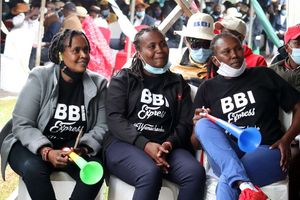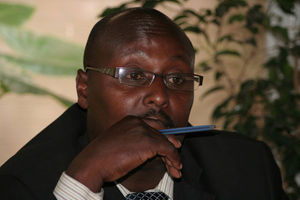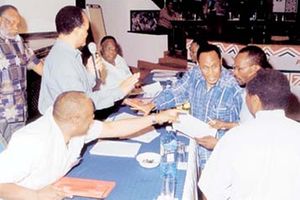
The Senate in a past session.
All eyes are now on the Senate to see whether it will approve a constitutional amendment Bill seeking to entrench three national government funds into the Constitution, after the National Assembly overwhelmingly voted in its favour.
The Constitution of Kenya (Amendment) Bill, 2025 seeks to anchor in the Constitution the National Government Constituency Fund (NG-CDF), the Senate Oversight Fund (SOF) and the National Government Affirmative Action Fund (NGAAF).
“The establishment of the funds will ensure reasonable access to exclusive national government functions and ensure the participation of the people in identifying and implementing priority government programs,” reads the Bill, co-sponsored by MPs Dr Otiende Amollo (Rarieda) and Mr Samuel Chepkong’a (Ainabkoi).
If passed into law, Parliament will be required to enact three laws to guide the operationalisation of the three funds.
The Bill, which seeks to amend Article 204 of the Constitution to introduce Articles 204A, 204B, and 204C, passed the Third Reading in the National Assembly after 298 MPs voted in support—effectively signalling the Senate to prepare for concurrence.
The Constitution requires that at least two-thirds of MPs in the National Assembly (233 of 349) and at least 45 of the 67 Senators must be present and voting in both Houses for a constitutional amendment to pass.
This Bill represents a last-ditch effort by MPs to entrench the NG-CDF into the Constitution after the Supreme Court declared it unconstitutional.
The Court gave the national government until June 30, 2026, to wind up the fund.
However, the National Assembly is not ready to let go of the fund—which many say defines an MP’s influence in the 290 constituencies—without a fight, even as it becomes increasingly likely that the Senate may not cooperate.
If the Senate votes to block the Bill, as it has indicated in no uncertain terms, MPs in the National Assembly will have no choice but to wait six months before trying again.
Dr Amollo said the National Assembly opted for the parliamentary route to entrench the funds because a popular initiative (referendum) would be expensive. However, he challenged those opposed, stating Parliament is also ready for that path if needed.
“If others think they can block this because they are fighting the National Assembly, we can still take the popular initiative route and still achieve it,” said Dr Amollo.
If the Senate concurs, it will mark the second time Parliament has successfully attempted to amend the Constitution through both Houses.
The first was the 2021 Building Bridges Initiative (BBI), which the Supreme Court later halted as the country prepared for a referendum.
“We are quite sure that we can get it through the referendum,” added Dr. Amollo.
At the Second Reading of the Bill, 304 MPs voted in favour, allowing it to proceed to the Committee of the Whole House for clause-by-clause consideration.
At both stages of voting, House Speaker Moses Wetang’ula permitted three indisposed MPs—Clement Siloya (Sabatia), Joseph Samal (Isiolo North), and Abraham Kirwa (Mosop)—to vote virtually from their hospital or resting beds.
Bungoma County Woman MP Catherine Wambilianga was also given a chance to vote remotely but was unreachable at the time.
The Bill was introduced in the National Assembly on March 12, 2025. According to Dr Amollo, it aligns with the Constitution's goals of decentralisation and resource devolution.
“If you fight these three funds, you are not fighting MPs—you are fighting the people of Kenya. We want to constitutionalize these funds to end constant litigation. We chose the parliamentary initiative because the popular initiative is expensive,” said Dr Amollo.
Dr Amollo's remarks came as Minority Leader Junet Mohamed (Suna East) urged the Senate to support the Bill.
“This Bill is not about MPs—it’s about Kenyans. Any money that is devolved benefits the people. Each Senator will get KSh1.5 million per month per constituency under the Senate Oversight Fund,” said Mr. Mohamed.
“I urge the Senate to support this Bill just as they support counties. Every shilling that is devolved helps the people of Kenya.”
Majority Leader Kimani Ichung’wah (Kikuyu) emphasised that the current NG-CDF is not in competition with county governments and that the proposed amendments do not seek to change that.
“If anything, NG-CDF supplements what both the national and county governments are doing to provide services to the people who elected us,” Mr. Ichung’wah stated.
The Bill proposes a new Article 204A to establish the NG-CDF, ensuring the provision of exclusive national government functions in each constituency.
“The NG-CDF shall be a national government fund consisting of monies appropriated from the national government’s share of revenue as allocated by the annual Division of Revenue Act (DoRA),” the Bill reads.
DoRA is enacted each financial year in accordance with Article 218 of the Constitution.
“All monies allocated under this Article shall be considered as funds allocated to constituencies and shall be administered in accordance with an Act of Parliament,” the Bill proposes.
The proposed Article 204B establishes the Senate Oversight Fund (SOF) to ensure the Senate is adequately resourced and empowered to fulfil its oversight functions, while Article 204C establishes the NGAAF.






